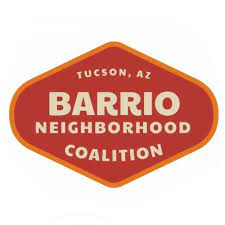To: City of Tucson Planning Commission
Daniel Bursuck, Planning and Development Services
Regina Romero, Mayor
Lane Santa Cruz, Ward 1 Councilperson
Paul Cunningham, Ward 2 Councilperson
Karin Uhlich, Ward 3 Councilperson
Nikki Lee, Ward 4 Councilperson
Richard Fimbres, Ward 5 Councilperson
Steve Kozachik, Ward 6 Councilperson
Michael Ortega, City Manager
From: Barrio Neighborhood Coalition
The Barrio Neighborhood Coalition (BNC) has been working tirelessly since 2018 to stress to Mayor and Council and City Staff just how important the issues of gentrification, displacement and housing affordability are. Through our efforts, there is now a Commission on Equitable Housing and the process for GPLET and Central Business District approval was slowed down to include community input. A report concerning these issues was commissioned from the University of Arizona (and completed by Dr. Gary Pivo) and a guiding plan for Affordable Housing was presented by HCD Director Liz Morales in a recent August 2021 study session.
While the BNC appreciates that the city is currently working on one of the seven recommendations from Dr. Pivo’s report (Accessory Dwelling Units), this is a drop in the bucket of our city’s affordable housing needs, and we are concerned that focusing on this topic means that serious attention isn’t being paid to other items on the list that could have a great impact. Here is a reminder of all of the items suggested in the report:
- “Establishment of an independent real estate advisor” to review all applications by developers for tax abatements.
- The hiring by the City of “an independent body… to publish bi-annual CBD Development Performance Index.”
- To “combine the abatements with other incentive opportunities, including from other agencies, such as the Rio Nuevo Tax Increment Finance District, in order to put the public in the best position to achieve high priority public benefits.”
- The use of “a larger share of its revenues from GPLET projects to meet the needs of low-income communities.”
- The employment of a “budget equity assessment tool … requiring departments to consider the equity effects of their programming and what they can do to redress known needs and problems.”
- The need for the policy makers to “focus future abatements on housing in the Central Business District and future expansion areas, especially housing affordable to those earning less than $35,000 a year.”
- Encourage the “conversion of single family units to duplexes,” (the other part of the suggestion on “allowing accessory dwellings (or duplexes) as a solution.”)
- The need for the City to create “accountability mechanisms for ensuring that investments align with priorities, commitments are fulfilled, and investment dollars are accounted for.”
While it might seem to city staff that enough time has been spent on the Accessory Dwelling Unit (ADU) proposal, there has been an absence of real, meaningful discussion with each potentially impacted neighborhood/barrio. This is not a one-size-fits-all problem, nor is this solution the way to move out of the affordable housing crisis happening right now. Not everyone has access to an internet connection to be able to participate in online meetings, which is the only way the city has been holding meetings currently.
Furthermore, the BNC has many concerns with the ADU ordinance as presented. We are most disquieted with the level of regulation (or lack thereof), the potential for the units to be turned into short-term rentals (e.g. AirBNBs), and the illusion that these units will help with the affordable housing crisis, when there is zero guarantee that any of the units built will be considered affordable. We do acknowledge that ADUs are a potential way to help seniors age in place, create intergenerational wealth, and to increase density. BNC members appreciate the amnesty program that is built into the ordinance to help homeowners who need to bring current structures up to code.
As always, however, we are also concerned about process. The city’s process is moving quickly and mistakes will be made, some of which might be difficult to change without involving lawsuits. Why not take the time to get some deep community input? We realize that in crisis mode the prevailing attitude is often “let’s just get something done and we’ll figure out the details later” and we recognize that our affordable housing issues are so profound that any actual increase in affordable housing is an improvement at this point. Nonetheless, we implore you to please slow down this process, have a longer, deeper community discussion and study any unintended consequences and how to mitigate them before passing this ordinance.
Thank you for your consideration.
Barrio Neighborhood Coalition
bnctucson1@gmail.com

